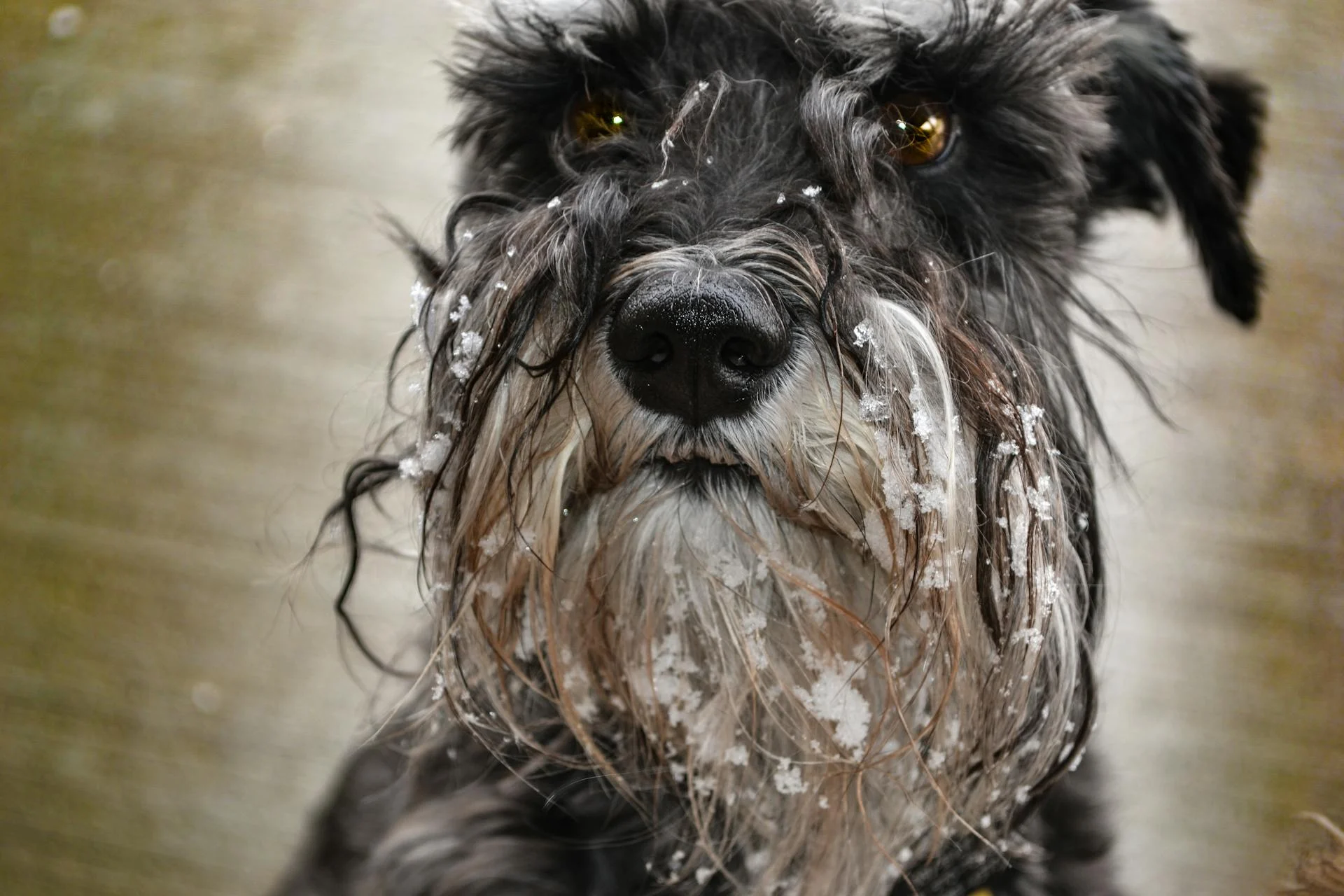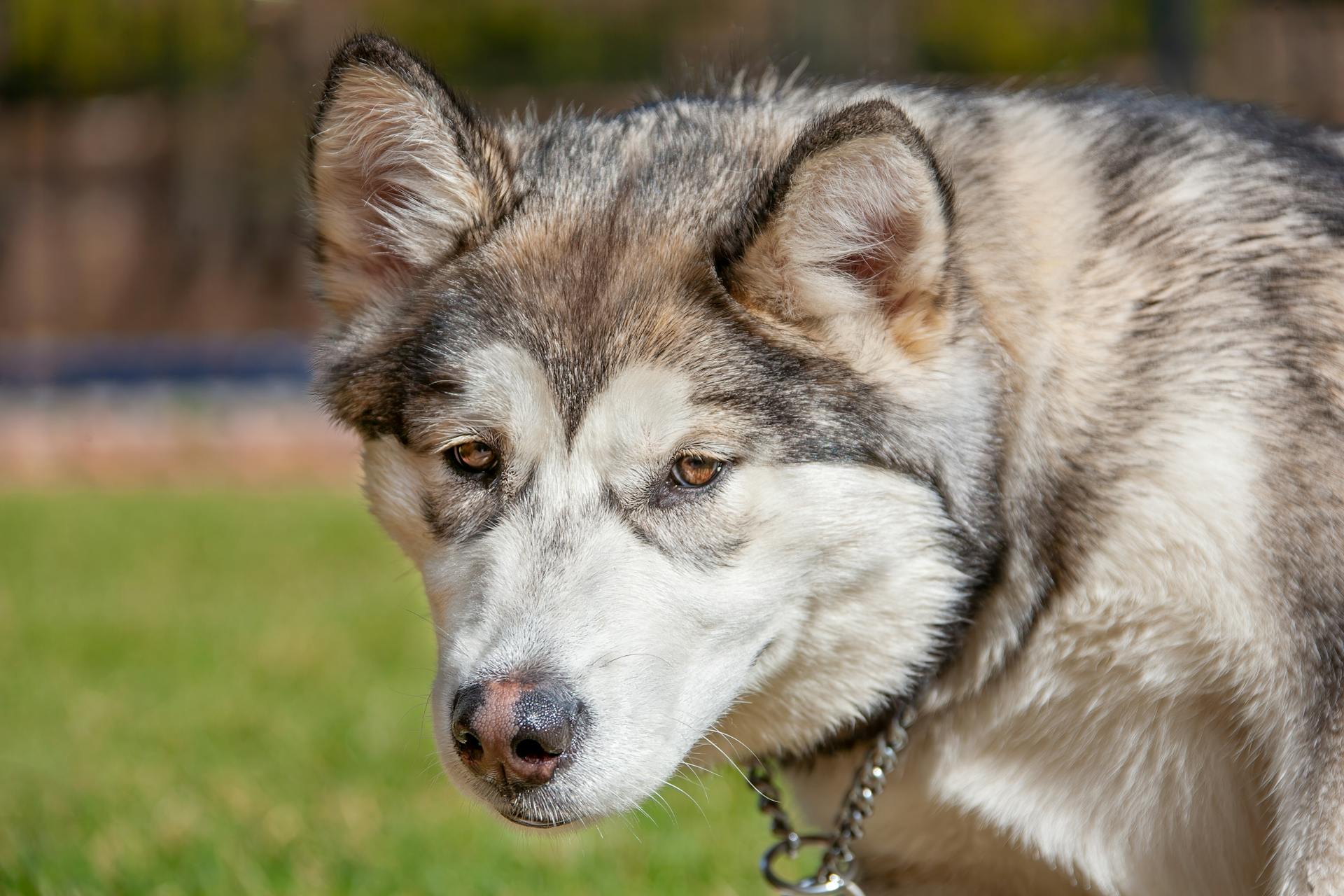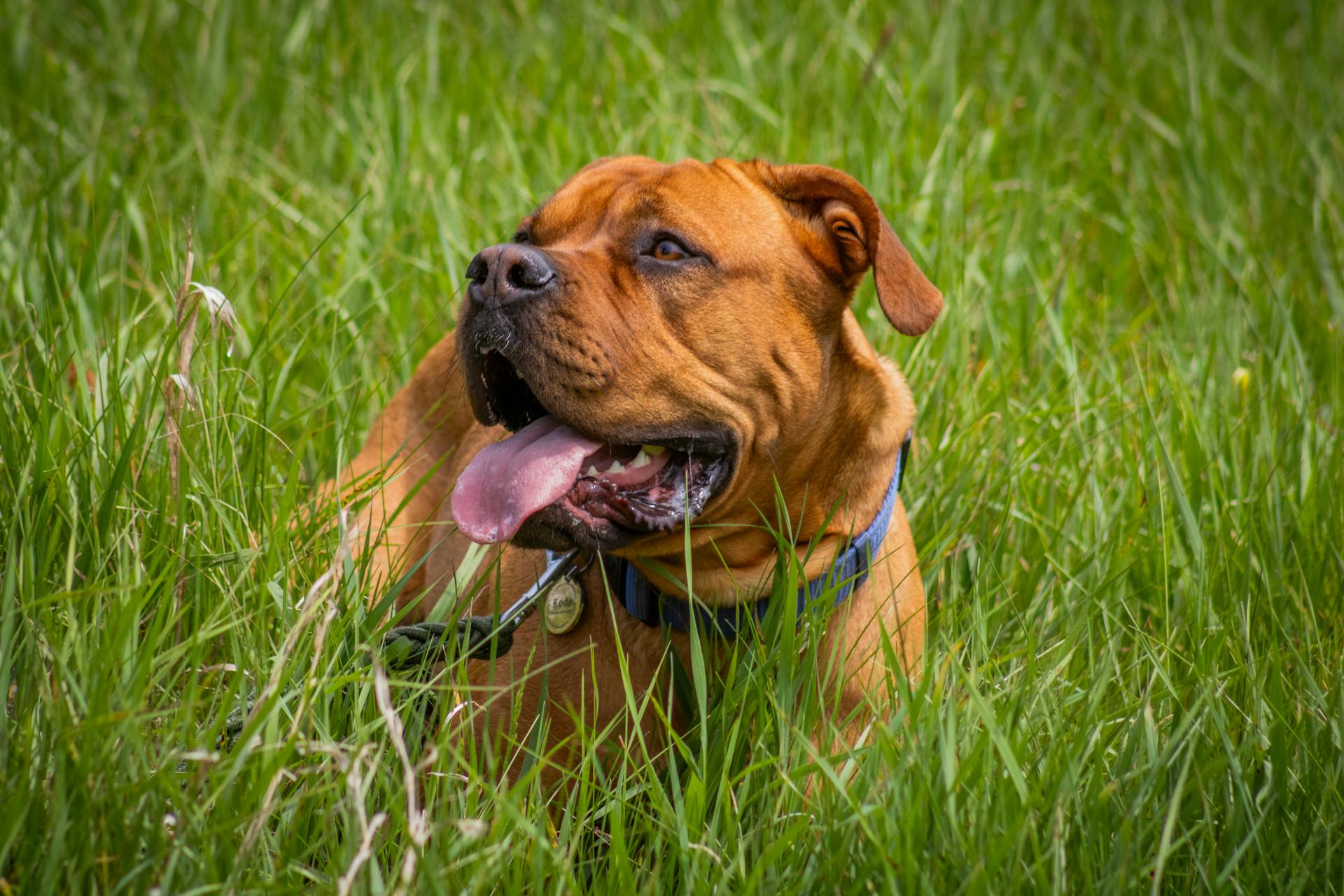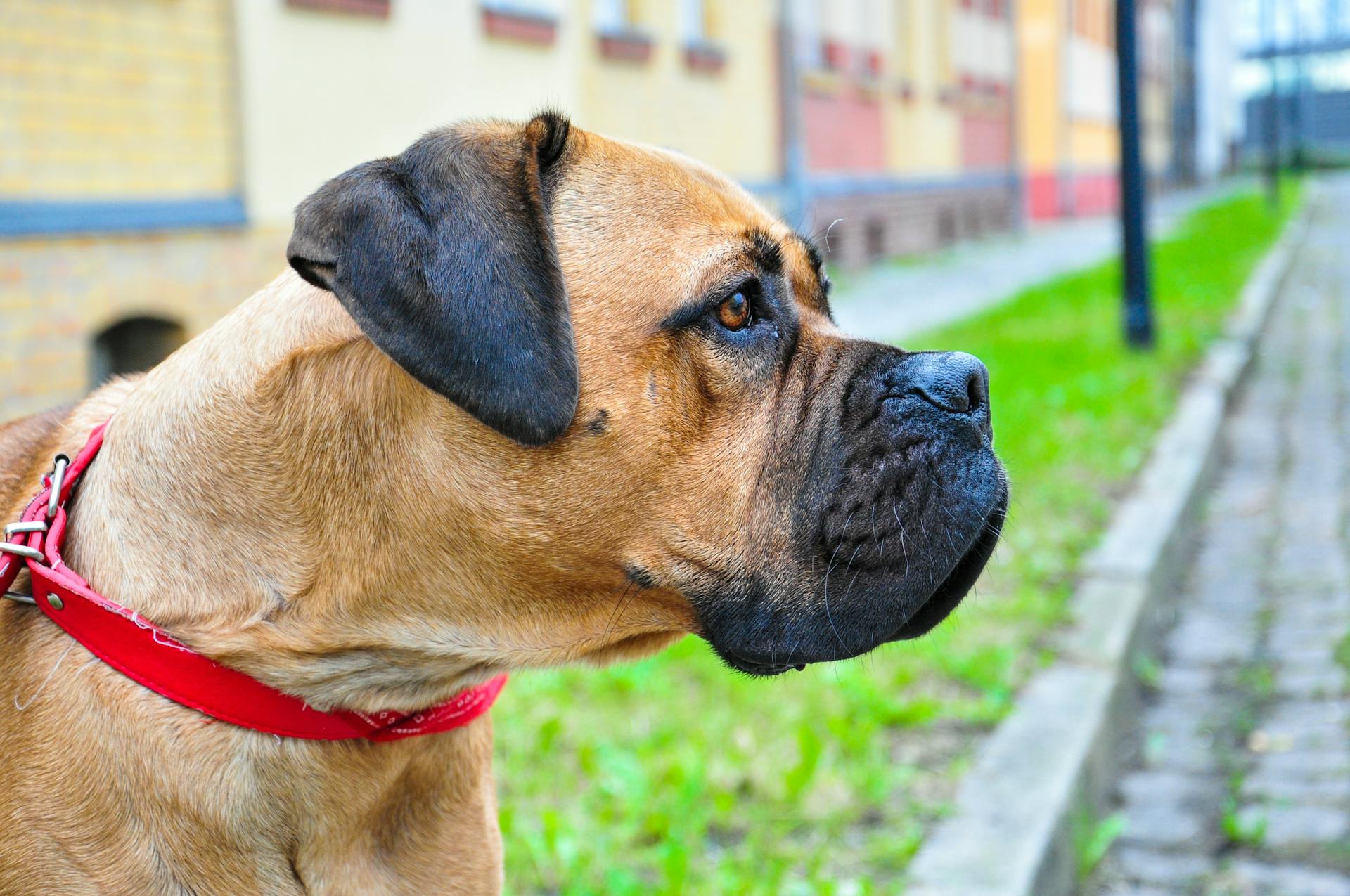
Giant Schnauzers are known for their distinctive beards and eyebrows, but what really sets them apart is their unique personality. They're naturally protective of their families and can be wary of strangers.
Giant Schnauzers are often described as loyal and loving, but also strong-willed and independent. This means they require consistent training and socialization from an early age.
One thing to keep in mind is that Giant Schnauzers can be sensitive, so it's essential to approach them with patience and understanding. They thrive on positive reinforcement and clear boundaries.
Their intelligence and energy levels make them a great fit for active families or individuals who can provide them with plenty of exercise and mental stimulation.
Giant Schnauzer Personality
Giant Schnauzers are known for their high energy levels and require lots of daily exercises to keep them happy and healthy. They have lots of stamina and are ideal dogs for runners, hikers, bikers, and swimmers.
Their high energy levels also mean they can be aggressive towards other animals, especially cats and small pets, if not properly socialized. This is why it's essential to consider not having other pets when bringing a Giant Schnauzer home.
Giant Schnauzers are highly protective of their owners, themselves, and their territory, which makes them excellent guard dogs. However, this also means they can be overprotective if not socialized properly, so early training and consistent socialization are a must.
One of the best attributes of Giant Schnauzers is their intelligence and loyalty. They are highly trainable and easily motivated, making them a great choice for families who are willing to invest time and effort into their training.
Here are some key personality traits of Giant Schnauzers:
- Energetic, active, and athletic
- Protective of owners; excellent guard dog
- Easily motivated and trainable
- Confident, steady, and fearless
- Lovable, playful companion
- Trustworthy and dependable
However, they can also have some negative traits, such as a tendency to bark excessively and being independent and headstrong. With proper exercise and socialization, these traits can be managed, and your Giant Schnauzer can become a calm and loving family companion.
A fresh viewpoint: Personality Traits of Chihuahuas
Breed Basics and Care
Giant Schnauzers are a unique breed with a rich history. They originated in the Bavarian region of Germany and were bred to drive cattle.
Their average height is between 23.5-27.5 inches, and their average weight is 55-90 pounds. Males are larger than females and tend to be taller due to their clipped, erect, and alert ears.
Giant Schnauzers have a weather-resistant coat that requires regular stripping or clipping to prevent matting. Weekly brushing is also necessary to keep their coat healthy and looking its best.
They are high-energy dogs that require lots of daily exercise to stay happy and healthy. A fenced yard is a must, as they have a strong prey drive and can be prone to running off.
Giant Schnauzers are generally a healthy breed with an average lifespan of 12-15 years. However, they can be prone to certain health issues, including hip dysplasia, hypothyroidism, joint disorders, and gastric torsion.
For another approach, see: Shiba Inu Coat
Here are some key care requirements for Giant Schnauzers:
- Weekly brushing and regular stripping or clipping
- Daily exercise, including walks and playtime
- A high-quality diet that meets their nutritional needs
Early training and socialization to prevent aggressive behavior
By understanding these care requirements and providing the necessary attention and exercise, you can help your Giant Schnauzer live a happy and healthy life.
Giant Schnauzer Information
Giant Schnauzers are highly spirited and obedient dogs that thrive on exercise and mental stimulation. They require a strong leader and adequate exercise to stay calm and well-behaved.
One of the best attributes of Giant Schnauzers is their low shedding tendency, thanks to their weather-resistant coat. This makes them a great choice for people with allergies or who don't want to deal with excessive dog hair.
Giant Schnauzers are naturally protective of their owners and make excellent guard dogs. However, they can be overprotective if not socialized properly.
Here are some key characteristics of Giant Schnauzers:
- Energetic, active, and athletic
- Protective of owners; excellent guard dog
- Easily motivated and trainable
- Confident, steady, and fearless
- Lovable, playful companion
- Trustworthy and dependable
It's essential to note that Giant Schnauzers can be prone to barking excessively if they don't receive enough mental and physical stimulation. They also have a strong prey drive and may see cats and small animals as potential targets unless trained otherwise.
Frequently Asked Questions
Is the Giant Schnauzer a good family dog?
Giant Schnauzers can be a good family dog for experienced owners with older children, but they may not be suitable for first-time pet parents or families with small kids or pets. Proper training and socialization are key to a harmonious household with a Giant Schnauzer.
What are the cons of a Giant Schnauzer?
Giant Schnauzers can be dominant or aggressive towards other dogs and may have strong prey instincts, making them a challenging breed for some owners
Are Giant Schnauzers cuddly?
Giant Schnauzers are affectionate companions that love their people and enjoy being around them. While they may not always want to cuddle, they make loyal and loving companions.
Do Giant Schnauzers bark a lot?
Giant Schnauzers are generally quiet dogs that only bark when necessary, such as alerting to strangers or boredom. They tend to be calm and reserved, barking only occasionally unless left alone for extended periods.
Sources
- https://www.thefarmersdog.com/digest/the-schnauzer-guide-vocal-headstrong-guard-dogs/
- https://www.petguide.com/breeds/dog/giant-schnauzer
- https://royalgiantschnauzers.com/getting-to-know-your-giant-schnauzer/
- https://hillcreekvet.com/client-resources/breed-info/giant-schnauzer/
- https://familypetcarecenter.com/client-resources/breed-info/giant-schnauzer/
Featured Images: pexels.com


